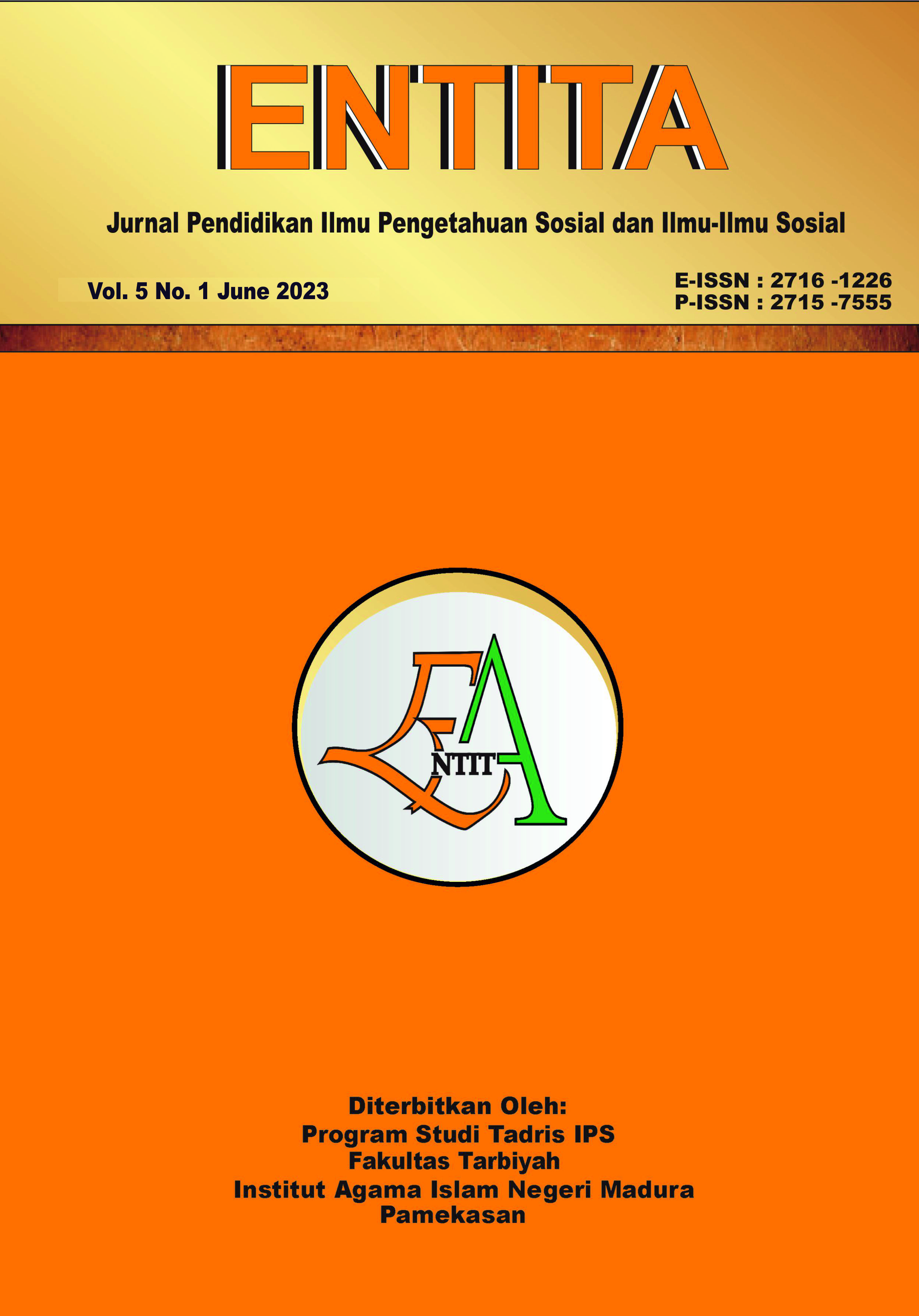The Urgency of Social Studies Education in a Multicultural Society
 Abstract views: 192
,
Abstract views: 192
,
 pdf downloads: 270
pdf downloads: 270
Abstract
Multicultural society is a society that is synonymous with diversity. In Indonesia, diversity is a necessity which in the end does not only bring positive influences, but also negative influences attached to it. Because of the existing diversity, it does not only make Indonesia a unique country but at the same time creates frictions that can lead to the breakdown of unity which is the lofty ideal of the nation's founding fathers. Through IPS education, it is hoped that future generations will be able to survive amidst of increasingly complex frictions of a multicultural society. Instilling human values in diversity is the main goal of the expected learning process. This study uses the method of literature study. The data were obtained through various literature, both
from books and journals related to the topics discussed and presented descriptively. Data obtained from various literatures were analyzed qualitatively. Therefore, the actualization of social studies education is a preventive step that can provide students with future generations in dealing with all problems of a multicultural society which in the end becomes an important thing in creating peace in a multicultural country.
Downloads
References
Arif, M. (2021). Model of Interreligious Harmony in the Multicultural Society of Cigugur
Village. Madani ideals.
Ayudia, I., & et al. (2022). Elementary School IPS Education. Indonesian Science
Media.
Ayunda, A. Z., Urbaningkrum, S. M., Nusaibah, A. W., Septiana, W., Widayani, S. S.
N., & H, A. R. (2022). Challenges of Multiculturalism in Indonesia: Questioning
Relations between Religion and Public Space. Alsys: Journal of Islam and
Education, 2(1), 1–18.
Baidhawy, Z. (2005). Religious Education with Multicultural Insight. Erlangga.
Davies, S.G. (2017). Gender Diversity in Indonesia. Indonesian Torch Library
Foundation.
Hilmi, M. Z. (2017). Implementation of IPS Education in Social Studies Learning in
Schools. Mandala Education Scientific Journal, 3(2).
J.A, D. (2014). Becoming Indonesia Without Discrimination (Data, Theory and
Solutions). Inspiration. co.
Kustiani, L., & et al. (2016). Teaching Materials for IPS Insights Course as a Study in
the Formation of Attitudes and Values. NusaCreative Media.
Nurhayati, I. and A. (2020). Multicultural Society: Conception, Characteristics and
Forming Factors. Academics, 14(1).
PGSD/MI, T. D. (2020). Strengthening National Identity Through Multicultural
Education: Concepts-Implementation. Guepedia.
Pratiwi, Diani Ayu, D. (2021). IPS Basic Concepts. Muhammad Zaini Publishing
Foundation.
Puspitasari, R., & Permana, R. (2022). The Development of a Global Society. Damera
Press.
Rofiq, M.A. (2020). HOTS (Higher Order Thinking Skills) Oriented IPS Basic Concepts
for Elementary School Teacher Education. CV. Archipelago Pillars.
Rosyad, R., & et al. (2022). Tolerance and Peace in Multicultural Societies. Study
Program of S2 Religions at UIN Sunan Gunung Djati Bandung.
S, L.A., & et al. (2022). Pancasila as a Perspective in the Development of IPS-PKN
Education. Lakeisha.
Setiawan, D., & et al. (2022). Integrated IPS Learning. Our Writing Foundation.
Sudrajat. (2014). Multicultural Education to Improve the Quality of Social Studies
Learning in Elementary Schools. Jipsindo, 1(1).
Supeni, S. (2020). Internalization of IPS Education in a Global Perspective in
Elementary Schools. UNISRI Press.
Untari, S., & Rianto, G. (2019). Explore Pancasila Education and Citizenship Volume
Duta Publisher.
Widodo, A., Indraswati, D., Sutisna, D., Nursaptini, & Anar, A. P. (2020). Social Studies
Education Responding to the Challenges of the 21st Century: A Criticism of
Social Studies Learning Practices in Elementary Schools. Entita: Journal of
Social Science Education and Social Sciences, 2(2), 185–198.
Yaqin, M.A. (2019). Multicultural Education Cross Cultural Understanding for
Democracy and Justice. LKIS.
Zahrawati B, F. (2018). Freeing Children with Physical Disability in Realizing a
Democratic Multicultural Society. Al-Maiyyah, 11(1).
Zed, M. (2008). Library Research Methods. Obo Library Foundation
Copyright (c) 2023 ENTITA: Jurnal Pendidikan Ilmu Pengetahuan Sosial dan Ilmu-Ilmu Sosial

This work is licensed under a Creative Commons Attribution-NonCommercial 4.0 International License.
ENTITA: Jurnal Pendidikan Ilmu Pengetahuan Sosial dan Ilmu-Ilmu Sosial operates an Open Access policy under a Creative Commons Non-Commercial 4.0 International license. Authors who publish with this journal agree to the following terms:
- The copyright of the received article once accepted for publication shall be assigned to the journal as the publisher with licensed under a

- Journal is able to enter into separate, additional contractual arrangements for the non-exclusive distribution of the journal's published version of the work (e.g., post it to an institutional repository or publish it in a book), with an acknowledgement of its initial publication in this journal.
- Journal is permitted and encouraged to post their work online (e.g., in institutional repositories or on their website) prior to and during the submission process, as it can lead to productive exchanges, as well as earlier and greater citation of published work (see The Effect of Open Access).
- Here is Copyright Transfer Form that author can download and send to OJS during submission.

















